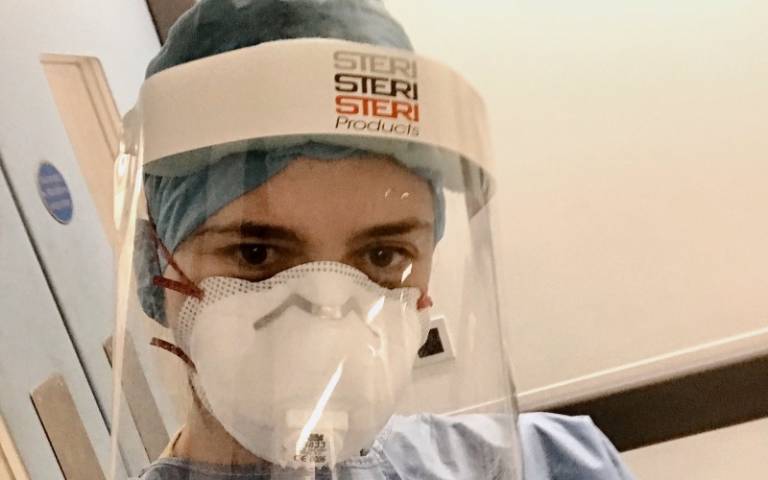Opinion: Graduate doctors need the support of their teams to add value
30 June 2020
In April this year, as part of the Government’s response to COVID-19, more than 300 of UCL Medical School's final year students were fast-tracked through graduation, enabling them to become frontline NHS doctors. Here Dr Sophie Bracke explains how she's found the transition.

In light of increasing pressure on the healthcare system due to COVID-19, the UK Foundation Programme Office has recently announced that final year medical students, most of whom received an early graduation and early provisional registration, would now be given the opportunity to start their training early and to take up the post of a Foundation Interim Year 1 (FiY1) doctor.
I was one of the many students who have recently started in this role, and despite the initial confusion surrounding the programme, I have found that my colleagues and I are an enthusiastic and passionate cohort who are committed to offering their help in these unprecedented times. However, that is not to say apprehension and nerves do not abound, as well as feelings of imposter syndrome and uselessness. To truly unlock the potential of the FiY1 doctors, they will need the support of their clinical teams.
This support can be provided in a multitude of ways. First, and foremost, it is important for teams to actually be aware of the presence of this new staff role. FiY1s are joining at random, interspersed times during an unprecedented and chaotic chapter of the NHS’s history. It is easy for an unfamiliar face to be overlooked. FiY1s should be introduced as the newest member of the team, as was done for me – these simple introductions made me feel welcomed and allowed team members to know that I was available to assist. After being introduced, it was not long before requests for my help started to flow in.
Relatedly, the team should be made aware of the exact role that the FiY1 is expected to fulfill, as well as the subtle differences between an FY1 and an FiY1. Team members working closely with the FiY1 should familiarise themselves with the existing guiding documents on FiY1 posts so it is clear what the limits of the FiY1’s responsibilities may be, and so that adequate supervision can be provided for tasks such as prescribing, which contrary to an FY1, an FiY1 is not allowed to do independently at my trust.
Understanding the exact responsibilities and tasks that an FiY1 can undertake is also important for appropriate delegation of work. FiY1s are no longer medical students who passively trail the consultant to watch the ward round. We are keen to get our hands dirty and, with the help and guidance of senior clinicians aware of our roles, should be encouraged to become active members of the team.
Support should also come from a more junior level of the team and I was fortunate to be paired with various helpful and supportive buddies whom I shadowed for the first few days of my FiY1 role and who took it upon themselves to gradually get me more involved. Having the close support of a more junior (and perhaps more approachable) colleague, who undertakes similar tasks to those done by an FiY1, makes the leap from shadowing to full-time working smoother and more manageable.
Moreover, when it comes to FiY1s, a small time investment can lead to a big time saving. It is unrealistic to expect that FiY1s will immediately know what to do, how to help or, in my case, how to use the brand new electronic prescribing portal. However, it often only requires a supportive team member to set aside some time once to succinctly demonstrate a skill or task that the FiY1 can then repeat on an ongoing basis. Give an FiY1 a task and you feed them for a day, teach an FiY1 a task and you free yourself for a lifetime.
Lastly, adequate support does not start and end with our first few days or weeks as an FiY1. In order to best utilise FiY1s, improve their confidence and highlight areas for improvement, regular informal feedback makes a big difference, as does allowing FiY1s the opportunity to raise their own concerns.
Ultimately, FiY1s have found themselves in this role during a time when many of us expected a break, to be on elective, or to still be under the comfortable guidance of medical school. It is a scary time, and open channels of communication are paramount for the wellbeing and mental health of the current cohort of FiY1s, which should not be forgotten in the midst of everything.
These are just some of the ways in which I have seen team support provided to FiY1 doctors and it has made a substantial difference. In what are unprecedented and uncertain times for the entirety of the healthcare sector, adequate support for the newest cohort of doctors can go a very long way in both ensuring that they really contribute value to their department and that they have the opportunity to thrive as their careers as doctors begin.
This article was first published in the BMJ on June 12, 2020.
Dr Sophie Bracke also discusses her experiences on the NHS frontline for the latest UCL Minds Podcast. To listen go to, Coronavirus: The Whole Story - Proud to help
Links
- Orginal article in the BMJ
- UCL Medical School
- UCL Faculty of Medical Sciences
Image
- Dr Sophie Bracke wearing Personal Protective Equipment (PPE).
 Close
Close

